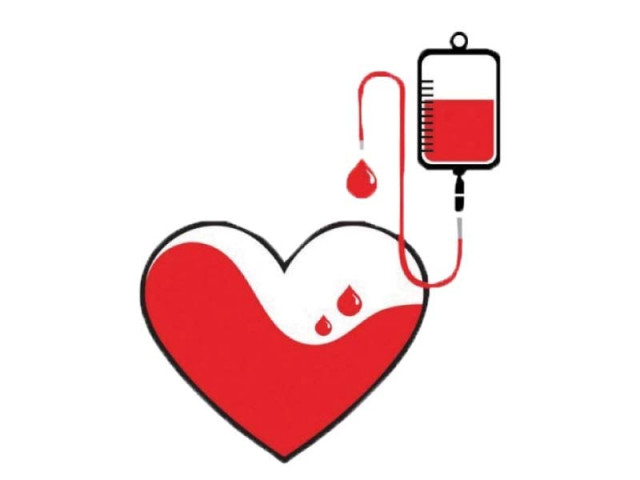From the depths of despair shines a beacon of hope
Despite struggling with disease for 25 years, Hashmi has dedicated her life to helping fellow Thalassaemia patients

“When I first started volunteering at the centre and saw young kids diagnosed with Thalassaemia coming here with a hope to live a little longer, and the way they look into my eyes, I immediately decided that I would like to dedicate my life to this cause and help them,” Hashmi told The Express Tribune.
Thalassemia is a genetic blood disorder and those afflicted with the disease are not able to make enough haemoglobin, which causes severe anaemia. Haemoglobin is found in red blood cells and carries oxygen to all parts of the body. When there is not enough haemoglobin in the red blood cells, oxygen cannot get to all parts of the body. As a result, patients’ organs become starved for oxygen and are unable to function properly.
Hashmi volunteers at the Frontier Foundation Welfare Hospital & Blood Transfusion Services in Peshawar and has been regularly rendering her services for the past 11 years. Despite in need of a blood transfusion every 25 days herself, Hashmi has fallen in love with Thalassaemia patients.
In fact, she treats all the registered patients at the centre like her family members and even calls them her “community.”
Recalling her past, Hashmi said that she was diagnosed with the disease 25 years ago when she was only nine years old.
Calls grow for thalassemia test before marriage
“Whenever my haemoglobin levels would go down, my father would get panic attacks as he was clueless how to help me immediately,” she said. “We belong to a poor family and my father would only earn Rs2,500 per month, whereas the cost for a single session of blood transfusion was around Rs1,100 back in the 1990s.”
With several marks of syringes due to repeated blood transfusion on her Antebrachium, Hashmi said that she started living with the diseases and promised to dedicate her life to Thalassaemia patients.
“Despite the pain and misery caused by the disease, once you realise that you will have to live with it, you must live with it,” she said.
With tears rolling down her cheeks, Hashmi narrated her ordeal and how her extended family members would shame her during family gatherings and hurl insensitive and hurtful remarks at her.
“Their behaviour pushed me into isolation and made me depressed. However, the volunteering experience brought me back to life,” she said.
With the growing number of people falling prey to Thalassaemia, parents are being repeatedly told to take precautionary measures and avoid marriages within the family.
Bringing smiles: Little thalassemia patients spend day at gaming zone
Apart from holding awareness sessions to sensitize people on how to stay protected, in 2009, the Khyber Pakhtunkhwa (K-P) assembly also adopted a bill making it mandatory for couples to carry out essential blood tests to prevent the spread of diseases like Thalassaemia and Hepatitis C.
The bill titled the Khyber Pakhtunkhwa [previously North-West Frontier Province] Health Preventive Act 2009, clearly states that every marriage in K-P before solemnisation shall fulfil precautionary measures.
“A Nikah Registrar shall obtain test reports of premarital screening of spouses for Thalassaemia and Hepatitis C,” the Act read, adding that if any marriage takes place in contravention of the law, the license of such Nikah registrars shall be cancelled and whoever, other than Nikah Registrar, solemnises such marriage shall be fined Rs10,000.
Even after having been passed by the provincial assembly, kids have been falling prey to the life-long blood disease and over 9,000 patients have been registered with the government besides aid organisations offering blood to patients diagnosed with Thalassaemia.
According to Hashmi, with the life-long disease, it’s the parents who suffer, running from pillar to post to find similar blood group for transfusion, adding that once parents find the blood, it is followed by screening of the blood and a cross match to check if the donor’s blood is compatible with the blood of the recipient. Blood transfusion without a cross-match could prove fatal for the patient.
Patients with Thalassaemia always require care at home since their haemoglobin levels [for men, 13.5 to 17.5 grams per deciliter and 12.0 to 15.5 grams per deciliter for women] is always required to be maintained. Such patients mostly stay at home.
It, however, is not the case with Hashmi who continues to volunteer and has become a role model for Thalassaemia patients, giving them the hope that the disease does not mean that a patients’ life has ended.
Published in The Express Tribune, October 10th, 2019.













COMMENTS
Comments are moderated and generally will be posted if they are on-topic and not abusive.
For more information, please see our Comments FAQ